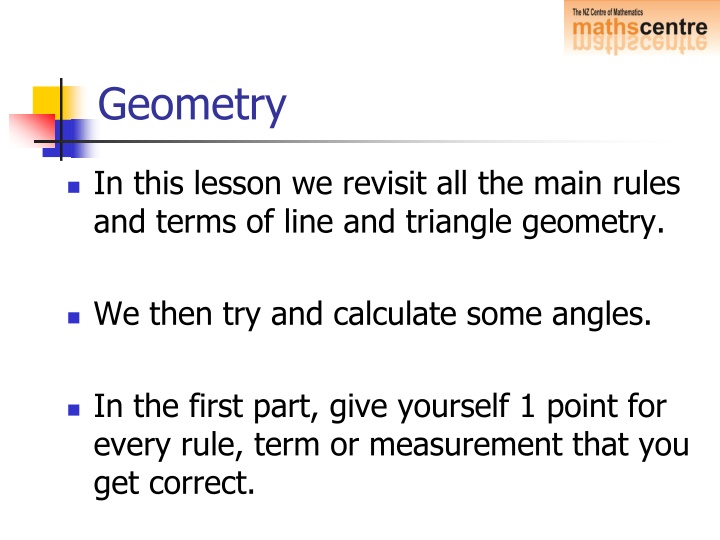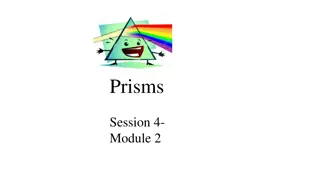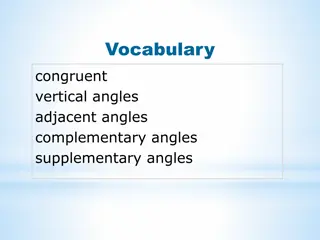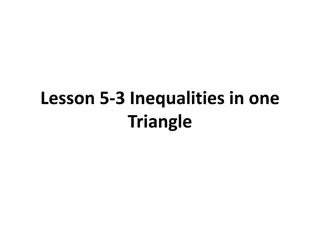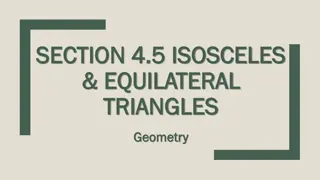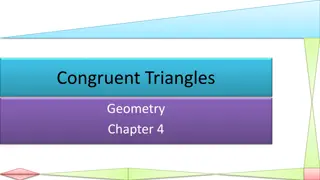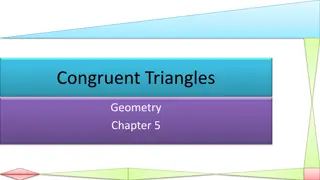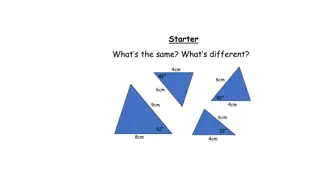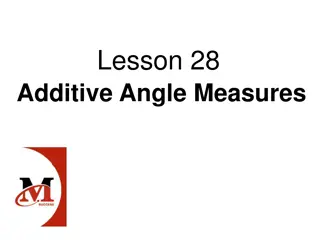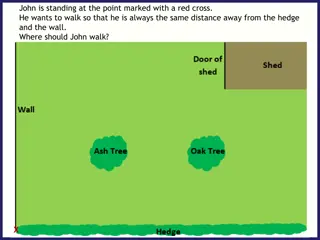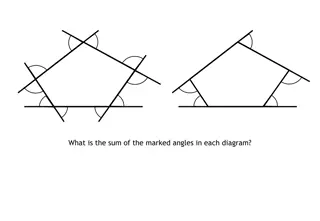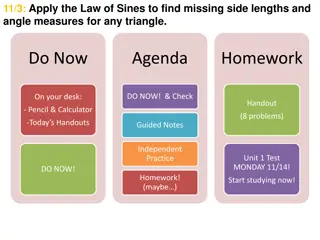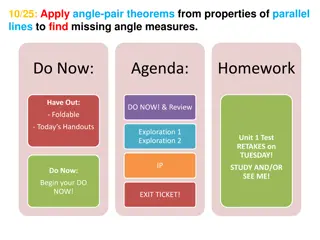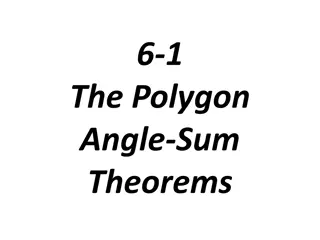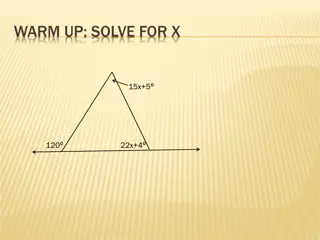Mastering Line and Triangle Geometry: Rules and Angle Calculations
Revisit the main rules and terms of line and triangle geometry to calculate angles. Understand types of angles, such as right, acute, obtuse, and reflex. Learn about various angle rules like angles on a straight line, angles at a point, vertically opposite angles, angles in a triangle, equilateral triangle angles, isosceles triangle angles, exterior angles of a triangle, complementary angles, supplementary angles, alternate angles, and corresponding angles for parallel lines.
Download Presentation

Please find below an Image/Link to download the presentation.
The content on the website is provided AS IS for your information and personal use only. It may not be sold, licensed, or shared on other websites without obtaining consent from the author.If you encounter any issues during the download, it is possible that the publisher has removed the file from their server.
You are allowed to download the files provided on this website for personal or commercial use, subject to the condition that they are used lawfully. All files are the property of their respective owners.
The content on the website is provided AS IS for your information and personal use only. It may not be sold, licensed, or shared on other websites without obtaining consent from the author.
E N D
Presentation Transcript
Geometry In this lesson we revisit all the main rules and terms of line and triangle geometry. We then try and calculate some angles. In the first part, give yourself 1 point for every rule, term or measurement that you get correct.
Types of Angle Below are 4 types of angles. Name each type. right angled acute obtuse reflex
Rule 1 180 Angles on a straight line add up to 75 60 45 180 - (75 + 60 ) = 45
Rule 2 360 Angles at a point add up to 75 50 105 55 75 360 - (75 + 50 + 55 + 75 ) = 105
Rule 3 equal Vertically opposite angles are 78 78
Rule 4 180 Angles in a triangle sum to 52 80 180 - (80 + 48 ) = 52 48
Rule 5 equal Angles in an equilateral triangle are 60 Each angle size is 60 60 60
Rule 6 Base angles of an isosceles triangles are equal 42 180 - 42 = 138 69 69 138 2 = 69
Rule 7 The exterior angle of a triangle is equal to the sum of the interior opposite angles 65 52 + 65 = 117 52 117
Rule 9 Angles that add up to 90 are called: a. Complementary b. Complimentary XXXXXXXXXXXX 25 Choose the correct spelling. 65
Rule 10 Angles that add up to 180 are called supplementary 158 22
Rule 11 (for parallel lines) equal Alternate angles are (alternate angles form a Z shape) 88 88
Rule 12 (for parallel lines) corresponding angles are equal (they form an F shape) 73 73
Rule 13 (for parallel lines) supplementary Co-interior angles are . (they form a U shape) 106 74
Name These Polygons A three sided polygon is called a triangle Name 4 types of triangle Right angled Scalene Equilateral Isosceles
Name These Polygons A 4 sided polygon is called a quadrilateral Name 4 types of quadrilateral square rectangle trapezium parallelogram
Name These Polygons pentagon 5 sides 6 sides 7 sides 8 sides 9 sides 10 sides 11 sides 12 sides hexagon heptagon octagon nonagon decagon hendecagon dodecagon
Do you know this? What is the difference between a polygon and a polyhedron? A polygon is a flat figure, like a square. A polyhedron is a 3D figure, like a cube.
Rule 14 The sum of the exterior angles of a polygon is 360 90 72 72 90 72 72 90 72 90
Rule 15 The sum of the interior angles of a polygon is (n 2) 180 What does the n stand for? 65 n = the number of sides for a triangle n = 3 (3 2) 180 = 180 80 35
Geometry Review What did you score? Did you get over 50? Only 49 points were available!
Angle Geometry Find the missing angles. 2x + 58 + 24 = 180 2x = 98 x = 49 58 x x 24
Angle Geometry Find the missing angles. 21 + 90 + x = 180 x = 69 y = 111 x y x 21
Angle Geometry Find the missing angles. y = 82 y 116 x 34 x = 64
Angle Geometry Find the missing angles. x = 72 x y z 71 37 y = 143 z = 109
Angle Geometry Find the missing angles. x = 60 x z y 60 y = 60 z = 120
Angle Geometry Find the missing angles. y y = 77 x z z = 77 26 x = 154
Angle Geometry w = 40 Find the missing angles. x = 70 x y = 40 30 z = 140 140 z y 70 w
Angle Geometry Find the missing angles. w =124 w x = 98 x 84 124 u = 110 w =128 26 v z 40 u v = 26 v 30
Angle Geometry Find the missing angles. x z w 32 y w y = 32 z = 148 x w = 58 x = 122 z
Angle Geometry Do you remember the formula for the sum of the interior angles of a polygon? (n 2) 180 Therefore what will be the sum of the interior angles of a quadrilateral? 360
Angle Geometry Here is a regular hexagon. Write the size of the red angles. 60 360 6 = 60 60
Angle Geometry Write the size of the interior angles. (n - 2) 180 = 4 180 = 720 Regular hexagon 120 120 120 120 = 720 6 = 120 120 120 60 Or from previous example 60 + 120 = 180
Angle Geometry Find the missing angles. y = 132 y 132 x x = 48
Angle Geometry Find the missing angles. 73 77 x 75 105 x = 105 y = 75 y
Angle Geometry Find the missing angles. 2x + 4x + x + 5x = 12x 12x = 360 x = 30 120 4x 2x x 60 30 150 5x
Angle Geometry Find the missing angles. x = 156 v = 24 24 x v v = 24 y = 156 z w y z = 156
Angle Geometry Find the missing angles. v v = 136 44 x = 44 x w w = 46 z = 46 y z y = 44
Angle Geometry Find the missing angles. w = 125 v = 108 w v 55 72 x x = 108 z = 55 y z y = 125
Angle Geometry Find the missing angles. z 27 z = 153 y x x = 27 y = 27 Alternate (Z) angles are equal.
Angle Geometry Find the missing angles. z z = 153 y y = 27 Co-interior (U) angles are supplementary.
An Excellence Question Prove that angle A is 2 angle B. Can you add a radius to make an isosceles triangle? B A
An Excellence Question Draw in an extra radius Radius 1 An isosceles triangle c c Radius 2
An Excellence Question Exterior angles = sum of interior opposite angles (Rule 7) c c 2c
An Excellence Question Have you solved the question? c d d c 2c 2d
The NZ Centre of Mathematics www.mathscentre.co.nz
